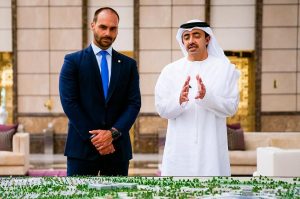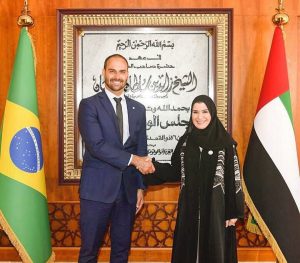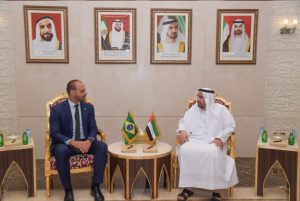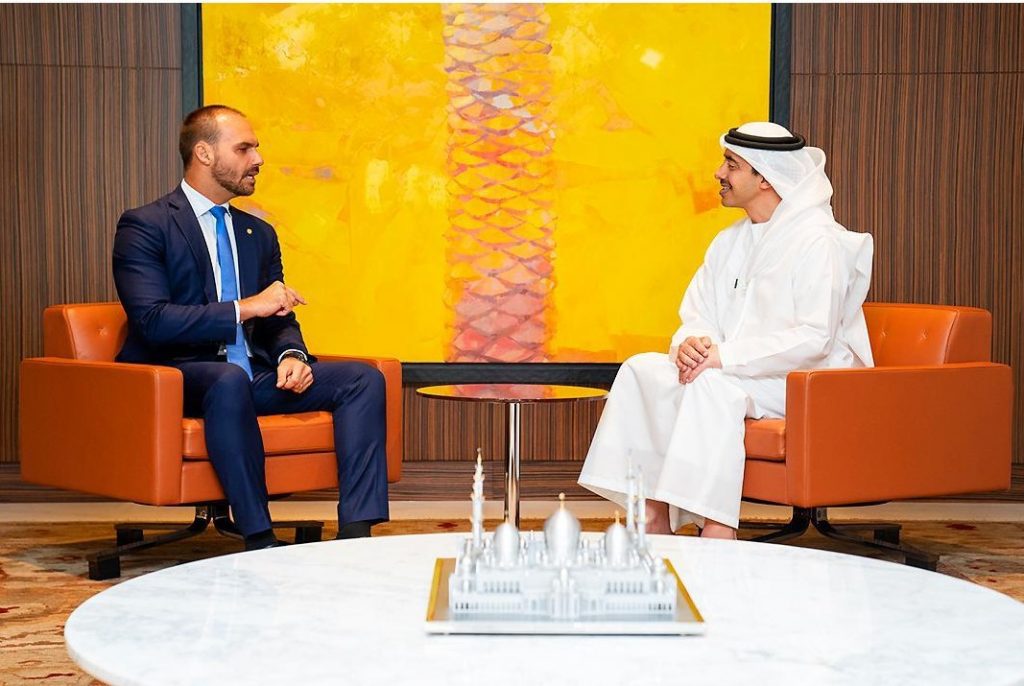São Paulo – Brazilian congressman Eduardo Bolsonaro, who presides over the Chamber of Deputies’ Foreign Relations and National Defense Commission, visited the United Arab Emirates last week and confirmed that his father, president Jair Bolsonaro, will go on a Middle East tour in late October. He is slated to go to the UAE, Saudi Arabia, and Qatar. “The first country he (the president) is visiting is the UAE. I spoke with Brazil’s foreign minister Ernesto Araújo, who authorized me to disclose this,” the congressman told ANBA over the phone in an exclusive interview last Saturday (3). Eduardo returned to Brazil on Sunday (4).
The UAE are working hard on building closer diplomatic ties with Brazil. In Abu Dhabi, the congressman met with a number of authorities and discussed trade, the conclusion of agreements, the political scenario in the Middle East, cooperation, the possibility of selling the Embraer KC-390 aircraft, and even the appointment of a Brazilian military attaché. Eduardo believes the Arab country could become a strategic partner for Brazil in the region, as well as a distribution hub for goods from Brazil. He also thanked and made a point of acknowledging the work of Brazil’s ambassador to the UAE, Fernando Igreja, who was by his side during the interview. The head of the Arab Brazilian Chamber of Commerce international office, Rafael Solimeo, was also present during the talk.
He also discussed geopolitical tensions in the region. “There are concerns regarding Iran. There’s fear that tensions might escalate, especially since the latest developments – United States sanctions over Iran’s nuclear program,” he said. Moreover, Saudi Arabia’s and the UAE’s ties with Qatar have been shaken, and all three countries will be visited by Brazil’s president. Eduardo Bolsonaro believes Brazil could help “broker some dialogue.” “Perhaps the president [Jair Bolsonaro] might be the ‘reconciler of the Middle East,’ he said.
Check out the highlights of the interview:
ANBA – What was the main purpose of your trip to the UAE?

Eduardo Bolsonaro – It was an invitation extended by the UAE’s ambassador to Brazil, Mrs. Hafsa [Al Ulama], as part of an effort to build closer ties with Brazil. It has also been confirmed that president Jair Bolsonaro will travel to the region in the last week of October. The exact date is not known yet. He will travel from Asia. He’s expected – this is not 100% certain – to come after a trip to Japan.
The first country he’ll visit in the region is the UAE; this much has been confirmed just now, in this meeting [on Saturday, 3] with [UAE] foreign minister Abdullah Bin Zayed Al-Nahyan (pictured at the beginning of this story). I spoke with Brazil’s foreign minister Ernesto Araújo, who authorized me to go public with this. It’s a response to overtures made by the UAE. The first ambassadress the president welcomed, while in his transitional cabinet, was the UAE’s, and the first Arab foreign minister to travel to Brazil was foreign minister Abdullah Bin Zayed.
Afterwards, he’ll travel to Saudi Arabia, where he’ll probably meet with [crown prince] Mohamad Bin Salman. The last country he’ll visit in the region will be Qatar.
What are the expectations surrounding these trips? What subjects will the president address? Is there a prior agenda of appointments, or agreements expected to be signed?
There are several agreements being worked on, especially by the Brazilian Ministry of Foreign Affairs. I’m advised not to go into much detail, because if I do and the agreements fall through, that could be a flub on my part. But the agreements pertain to trade, science and technology and other fields, perhaps military as well. The expectations are the best possible.
I got a request from congresswoman Amal Al Qubaisi, who’s president of the National Federal Council (a Parliament of sorts). She told me to look into how the double taxation agreement is moving forward. The agreement has already been signed (in November 2018) and is currently with the office of the president’s Chief of Staff. After that, it will move on to the Chamber’s Foreign Relations and National Defense Commission. In the capacity of president of the commission, I have pledged that as soon as it hits my desk, I will work fast so the agreement will take effect, after the so-called internalization (ratification).
I’ll confess that I’m impressed with what I’m witnessing here [in Abu Dhabi]: incredible quality of life, flawless roads, polite people, no graffiti on the streets, everything is squeaky clean, the cars are very high-quality. In short, I think this is a country to look up to. We must study this formula to try and apply some of it to Brazil, so we can make Brazil a bit more like Abu Dhabi.
What other meetings did you attend in the UAE? Did you meet with the deputy minister of Defense?
I met with Matar Salim Al Dhaheri (the undersecretary to the Ministry of Defense), which was quite interesting. Throughout the region, not only with authorities, but also by speaking with the waiters, I gleaned that there’s a concern with Iran. A fear that tensions might escalate, particularly after the latest developments – United States sanctions over Iran’s nuclear program. Note that Brazil, during a BRICS meeting (the block comprising Brazil, Russia, India, China, and South Africa), made a point of not backing Iran’s nuclear program. Brazil removed that bit from the BRICS’ joint statement of plans.
But the conversation with him was quite interesting. Apart from Iran, there is a mutual intent of military cooperation. I also discussed the KC-390 (Embraer’s military transport aircraft), that Brazil’s interested in selling this product. If we can, we will engage in these talks even at the presidential level, why not, and make a commitment. We are hoping to get great returns, because this is a great aircraft. Besides, we considered [appointing] a Brazilian military attaché for the region, an initiative which began to take shape during the [former president Michel] Temer administration, and there’s a good chance that this will take place soon.
What would be the job of this military attaché to the region?

To keep Brazil posted on every military issue across the region. It would ultimately be a tool for proximity between countries. Just as we, on the South American side, have a problem, for instance, with Venezuela, here we have a similar problem with Iran, proportions and differences aside. But it comes down to leaders whose actions occasionally cause concern in neighboring countries. This is certainly no different here. We hope a peaceful solution can be found. War isn’t interesting to neither side. That’s not what one wishes for, but rather to do what we can to prevent support to terrorist groups here in the region, Brazil will be there with the UAE.
Has Brazil committed to any action related to Iran?
No. You see, my role here is as a congressman and the Foreign Relations Committee president, so I try not to intrude in any Executive affairs. But it’s not in my powers to make any kind of declaration related to that. I’m conveying my perspective, what has been discussed, some idea from what I know about president Jair Bolsonaro, from what little I talked about this with foreign minister Ernesto Araújo.
So you know president Jair Bolsonaro a little…
Yeah, a little bit… (laughs). But there are some points we may not discuss unless ambassador Fernando Igreja, who’s here by my side, allows us to.
Will you visit any other country in the region during this trip?
No, unfortunately I’ll go back to Brazil tomorrow (yesterday), Sunday (4). I’d like to stay longer, but we have the second round of the Social Security reform to vote [this week at the Congress] in Brasília. But I surely want to come back and I don’t think that will take long.
Now, if you take post as Brazil’s ambassador to Washington, you won’t be able to visit the UAE.
No… But I did receive an invitation (laughs). There’s the matter of the embassy to the US. My nomination by the president has still to be ratified by the senators. And whatever the senators decide, it won’t keep us from working towards closer relations between the UAE and Brazil.
Do you believe it’s possible for the UAE to become Brazil’s main partner in the region as the UAE’s own government has been pushing for that?
Of course. It’s a country that has shown all these signs I talked about, of the ambassadress and the foreign minister Abdullah Bin Zayed going to Brazil. It has everything to succeed and to make the UAE into an input hub for products [from Brazil] here in the region, since they have so many good contacts with the countries in the region, including their Arab neighbors, mainly India, the world’s largest democracy. It may really expand our markets. And also, why not, walking side by side in the political issues here in the region. I believe the UAE and Brazil have much in common on freedom defense issues.
Just to finish then, you said the president will go to the UAE, Saudi Arabia, and Qatar. Now, UAE and Saudi Arabia relations with Qatar have been tense. Could you talk a little bit more about how Brazil deals with that? Wouldn’t visiting Qatar and the other countries at the same time create an issue?
Maybe the opposite will happen, and Brazil will turn out to be a link between these countries. To broker some dialogue. I know it’s hard and there are some issues between the countries in the region. Brazil wouldn’t come from the other side of Atlantic and dictate any rules, that’s not what I’m talking about. But maybe we could work towards closer relations: speaking highly about one and about the other. Anyway, Brazil may develop a very interesting role in the region. Qatar has an entirely different relation with Iran, and maybe president Jair Bolsonaro’s visit may give good results in that sense. Perhaps the president might be the “reconciler of the Middle East.”
Would youy like to highlight anything else you saw or discussed during this trip?

I believe that after this presidential visit, the idea of any retaliation by the Arab countries over moving [Brazil’s] embassy [to Israel] from Tel Aviv to Jerusalem would fall. I don’t feel any kind of animosity with the Arab world – in fact, the embassy would move to West Jerusalem, which is the part that is not debated with Palestine.
I think this will support our image as a peaceful country that seeks friendship and closer relations with the Arab world. I think that would be really good and would end this kind of rumor that I myself never believed, since I never saw any sheik or leader of any country here in the region talking ill about president Jair Bolsonaro or threatening any kind of trade retaliation with Brazilian products when this embassy move is implemented, which I, Eduardo, personally, see as certain. The point is not if, but when this move will happen.
You mentioned the issues of Jerusalem and Iran, which are two of the most sensitive matters in the Middle East. Brazil has good relations with all the countries in the region, specially trade relations. Isn’t it a little too dangerous to pick a side in these fights?
I don’t think so. To quote (Roman emperor) Vespasian, “Peculia non olet,” or “Money does not stink.” Of course, we wouldn’t trade with a country that is a hostage of drug trafficking, far from that. But this doesn’t keep us from doing trade and have our reservations or one-off critiques. It’s like when you sell your neighbor an apartment. You don’t have to agree with everything you neighbor does. If you want to sell it and they have the money to buy it, why not? I don’t believe that prevents freedom of speech. Obviously, you shouldn’t go so deep as to create a legal obstruction. But let’s picture the following scenario: how many billions of dollars does Brazil sell to the USA in aluminum? Some dozen billions, like 15 or 16. I’m guessing a number, but that’s what I think it is, some solid billions of dollars per year. Imagine if president [Donald] Trump says to Brazil: Brazil, if you don’t move your embassy to Jerusalem, I’ll cut Brazilian aluminum imports by half. It’s… It’s a matter of sovereignty, this embassy issue. It’s a decision that the president made. I don’t think this will cause any trouble. It’s obviously a little controversial, but it’s a campaign promise that president Jair Bolsonaro will follow through with soon.
Translated by Gabriel Pomerancblum & Guilherme Miranda




